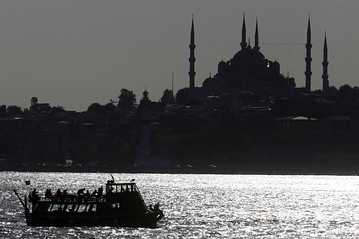By Gareth Jenkins
Monday, October 6, 2008
On the afternoon of October 3, a large force of PKK militants, probably several hundred strong (Hurriyet, October 4), attacked a Turkish military outpost in the village of Aktutun (Bezele in Kurdish), approximately 2.5 miles (4 kilometers) from Turkey’s border with Iraq. On October 4 the Turkish General Staff (TGS) announced that 15 Turkish soldiers had been killed in the attack and 23 wounded. Another two soldiers were missing and presumed dead. The TGS put the PKK death toll at 23 (TGS Press Statement NO: BA – 42 / 08, TGS website, www.tsk.mil.tr). On October 6 the PKK issued a statement claiming to be in possession of the corpses of the two missing soldiers (Agence France Presse, October 6).
The Turkish death toll was the highest in a single incident since June 2004, when the PKK returned to violence after a five-year ceasefire. On October 5 hundreds of thousands of Turks took to the streets across Turkey for the funerals of the soldiers whose bodies had been recovered. Turkish newspapers devoted pages to photographs of weeping mothers and inconsolable little children clinging to coffins draped with the Turkish flag. The photographs left little doubt that almost all of the dead, most of them conscripts performing their military service, came once again from the rural and small-town poor of Anatolia, who have borne the brunt of Turkey’s 24-year-old war with the PKK.
For most Turks, the emotional trauma was exacerbated by a sense of shock. In recent months, the Turkish army’s casualties have tended to come in ones and twos, mostly as the result of remote-controlled mines. As a result, many Turks had finally begun to believe the repeated statements by their politicians and generals that the PKK was in retreat; not least as a consequence of the frequent Turkish air raids against PKK camps and bases in northern Iraq.
On October 5, in one of the most detailed press briefings ever given by a serving member of the Turkish high command, Deputy Chief of Staff General Hasan Igsiz told journalists that the military units in Aktutun had successfully repulsed what he claimed was a PKK attempt to overrun the outpost (Radikal, Milliyet, Vatan, October 6).
From a purely military perspective, there is an element of truth both in Igsiz’s assertion of a military success and the TGS’s claims that the air raids against the PKK camps and mountains in northern Iraq have forced the organization onto the defensive and reduced its operational capabilities inside Turkey. Ever since it resumed its insurgency in June 2004, however, the PKK has essentially been waging a psychological rather than a military war, using violence as part of a campaign of psychological and emotional attrition in the hope of eventually convincing the Turkish authorities that the organization cannot be destroyed by military means and that the only solution is to enter into a political dialogue. From this perspective, the attack on Aktutun was undoubtedly a major victory for the PKK.
It is also unlikely to have been a coincidence that the attack occurred only a few days before the Turkish parliament is due to convene on October 8 to renew the one-year mandate allowing the Turkish military to conduct cross-border operations against the PKK in Iraq. The PKK will undoubtedly now feel that it has demonstrated to both its supporters and its enemies that the cross-border raids have failed to destroy it.
For many Turks, some of the details of the firefight provided by Igsiz have also raised questions about the military’s capabilities. Igsiz claimed that the Turkish military’s thermal imaging equipment first picked up the presence of PKK militants moving toward the Turkish border at 5:00 A.M., triggering an artillery bombardment of their suspected positions and forcing them to launch their attack during daylight. Yet, even though the Turkish military was able to call in reinforcements, including additional commando units, two F-16s, and four helicopter gunships, the firefight still continued through the afternoon and into the evening, when the surviving PKK militants were apparently able to withdraw under cover of darkness (Radikal, Milliyet, Vatan, October 6).
Perhaps more damagingly for the TGS, the assault of October 3 was the 38th time the military outpost in Aktutun had been attacked by the PKK in the last 20 years, resulting in the deaths of 44 soldiers, most recently on May 9 when six Turkish soldiers were killed (Milliyet, Hurriyet, May 10). Videos taken by the PKK and subsequently posted on the YouTube video-sharing website reinforce how vulnerable the outpost was to attack. They show militants deployed on the surrounding hills firing from heavy machine guns, anti-aircraft guns, and mortars into what is clearly, in military terms, an indefensible position (www.youtube.com). On October 5 Igsiz admitted that a decision had been made in 2007 to relocate the outpost but that its implementation had been postponed because of what he claimed were insufficient funds. It is an explanation that is unlikely to satisfy many Turks. On October 5 Igsiz announced that five particularly vulnerable outposts, including Aktutun, would now be relocated to more defensible positions (Anadolu Ajansi, October 5).
In addition to severely damaging the prestige of the TGS, the attack on Aktutun has also left the civilian government of Prime Minister Recep Tayyip Erdogan with a dilemma. When he heard of the attack, Erdogan cut short an official visit to Central Asia and returned to Turkey, vowing to do whatever was necessary to eradicate the PKK (NTV, October 4). On October 4 Turkish warplanes once again bombed suspected PKK targets in northern Iraq (TGS Information Note No. BN – 91/ 08 of October 5, www.tsk.mil.tr). More air raids can be expected in the days and weeks ahead. The problem for both Erdogan and the TGS is that after the attack of October 3, many Turks will need a lot of convincing that such measures are having any impact.
